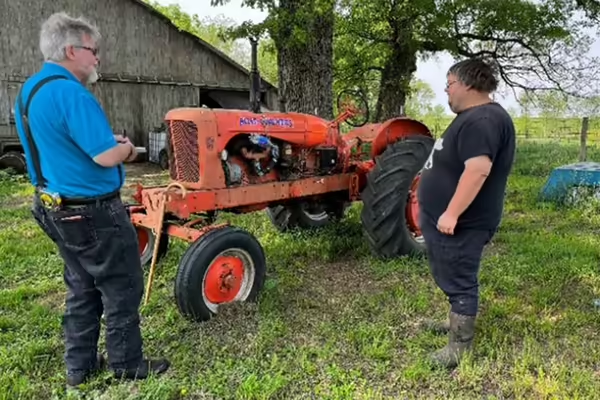
URBANA, Ill. — Farmers have always been the backbone of America. The state of Illinois includes 72,650 farms that cumulatively harvest over 27 million acres and are operated by 118,000 producers. The work involved is not only the farmer’s livelihood but rather their way of life.
Illinois AgrAbility is a program geared towards farmers, veterans in farming, and farmworkers who have experienced an age or injury-related disability or experience a chronic illness that precludes them from continuing their work in production agriculture. The program offers education and assistance to eliminate barriers, accommodate limitations, and help these individuals continue farming.
“Illinois consistently ranks among the most agriculturally productive states in the country," says Josie Rudolphi, director of Illinois AgrAbility and University of Illinois Extension specialist. “Our farmers and farm families are important to ensuring an abundant and safe food supply.”
“For many farmers, the presence of a disability, injury, or chronic health condition can jeopardize their livelihood and way of life,” says Rudolphi. “Yet, with some assistance, agricultural producers and workers with disabilities can safely and effectively continue to earn their livelihoods in production agriculture and participate fully in rural community life.”
Illinois AgrAbility works to:
- Identify farmers, veterans, or farmworkers with disabilities and or chronic diseases.
- Conduct free onsite farm assessments.
- Recommend safe equipment or devices (assistive technology).
- Provide educational opportunities and informational resources.
- Refer clients to other service providers for potential assistance.
A federal grant-funded USDA program, Illinois AgrAbility has served residents of Illinois for over 30 years. The program involves Extension educators, disability experts, rural professionals, and volunteers who work in partnership to offer various services at no cost to clients. To date, more than 1,500 farm clients have received one on one service through Illinois AgrAbility.
“An initial telephone interview followed by a farm site visit to meet with a client and their family and caregivers, if any, allows the AgrAbility representative to gather a tremendous amount of data essential for research and recommendations of appropriate assistive technology to the customer,” says Craig Wadsworth, client services representative for AgrAbility.
Wadsworth says they’ll ask participants what their current abilities are now and what they want to be able to do, and then we find available technology that helps them reach their goals.
In partnership with the Illinois Assistive Technology Program and Community Health Partnership of Illinois, Illinois AgrAbility is ready to serve farmers across the state. If you or someone you know within the agricultural industry needs assistance, please visit go.illinois.edu/AgrAbility and complete the brief client intake form at go.illinois.edu/AgrAbilityClientForm.
For questions, contact AgrAbility staff by email at agrability@illinois.edu or by calling 217-244-2948.
WRITER/SOURCE: Haley Jones, Illinois AgrAbility Program Coordinator, University of Illinois Extension
ABOUT AGRABILITY: Illinois AgrAbility provides direct services and solutions to farmers, veterans, and farmworkers in Illinois with disabilities so they can maintain their independence and continue farming. Illinois AgrAbility is a program within Illinois Extension. It is funded by the National Institute of Food and Agriculture, an agency of the U.S. Department of Agriculture, under sponsored project number 2022-41590-38130.
Illinois Extension leads public outreach for University of Illinois by translating research into action plans that allow Illinois families, businesses, and community leaders to solve problems, make informed decisions, and adapt to changes and opportunities. Illinois Extension is part of the University of Illinois Urbana-Champaign College of Agricultural, Consumer and Environmental Sciences.